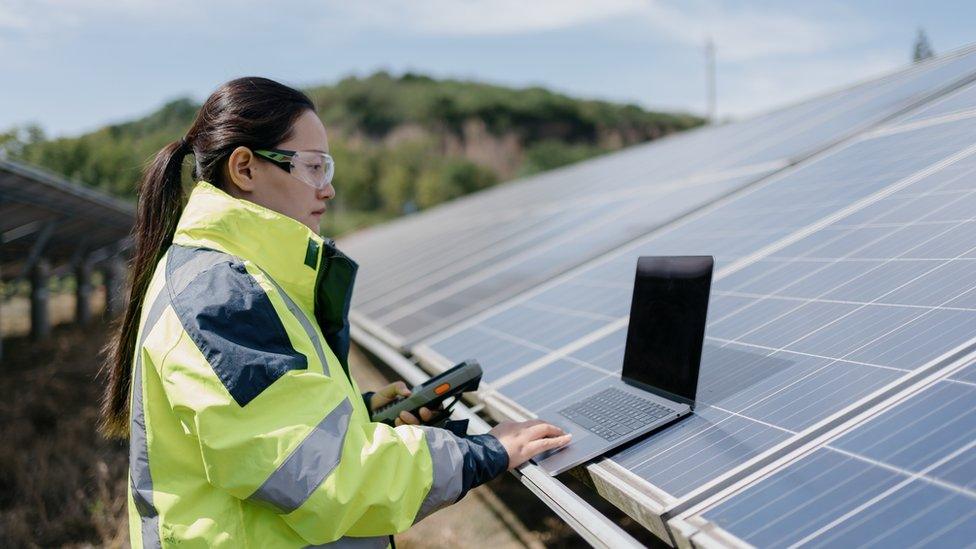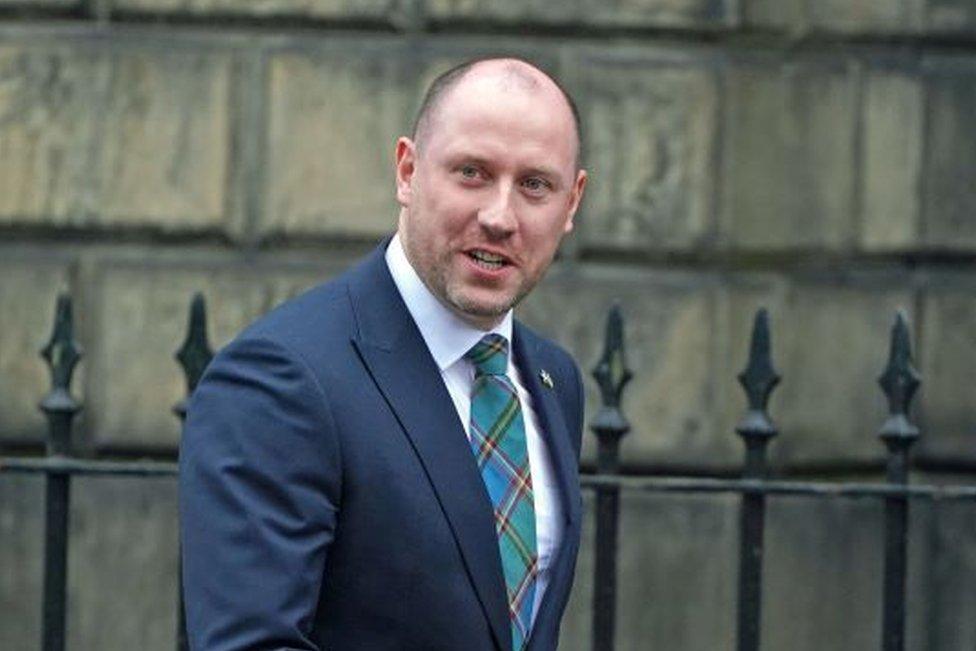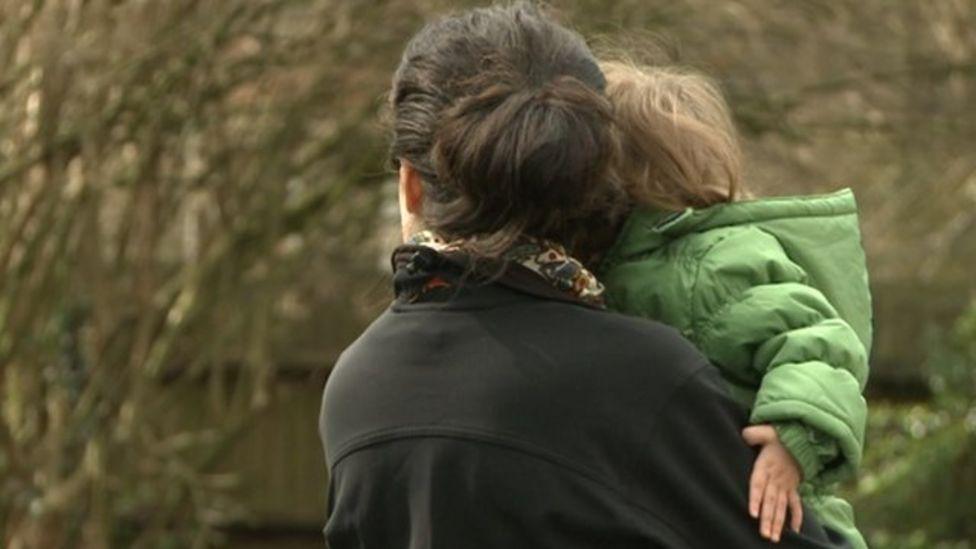Business 'ready to work towards wellbeing economy'
- Published

Firms are being asked to meet ambitious environmental targets
Business groups are willing to work with the Scottish government on its journey to a "wellbeing economy", says the cabinet secretary tasked with re-setting relations with them.
Neil Gray said trade organisations were reassured that government would back business to succeed and to grow.
But that support comes on condition that it is with a social purpose.
The aim of turning the economy towards wellbeing more than profit was embraced by Nicola Sturgeon as first minister.
Humza Yousaf has pinned his approach to the economy on going further on this journey.
But in an interview with the BBC, Mr Gray - who is cabinet secretary for the wellbeing economy, fair work and energy - said the priority of re-setting' the relationship with business, following Ms Sturgeon's leadership, requires ministers to understand that private sector firms need support and to be consulted at an early stage on new policies.
He was speaking ahead of a gathering in Iceland of representatives of countries committed to a wellbeing economy.
These also include New Zealand, Wales and Finland, with observers at the conference from Canada and Luxembourg.
In Scotland, several controversial policies have had to be stopped or postponed after business complained they were impractical and expensive.
They included the Deposit Return Scheme for drink containers, and a plan to ban advertising of alcohol, while the creation of a National Care Service has been paused. A review of business rates has been secured.
Ambitious targets
Mr Gray said: "The concept of what we're looking to achieve from our wellbeing economy approach is one business understands - with a strong business landscape, which allows business to grow and achieve good results, but to do so for a purpose, a fair work agenda, tackling child poverty, and looking after our planet".

Neil Gray believes the need for profits should be balanced with taxation
Privately, some business leaders are sceptical about the requirement to boost employee pay levels, higher earners being required to pay more in personal tax, and requiring firms to meet ambitious environmental targets ahead of their competitors in other countries.
This is seen as a distraction from the disappointing rate of economic growth under the SNP government, which made that its top priority when it came to power 16 years ago.
Mr Gray said the needs of business to be profitable and competitive will have to be balanced with regulation and tax.
"That is what our New Deal for Business group is trying to achieve - to ensure we have strong relationships across the business community, a practical and pragmatic approach to regulation, to ensure we involve business at as early a stage as possible, and ensuring there is a good understanding of where the taxes we're all paying are going to - good services, supporting our people, ensuring they are healthy and can continue to contribute through employment.
"This is a virtuous circle we can achieve, and I'm very pleased with the response the business community has come back with thus far."

What is a wellbeing economy?

Tackling child poverty is a major focus of the wellbeing economy
Cabinet secretary Neil Gray defines a wellbeing economy as "an economy that is fair, green and growing, to make sure we have a strong business landscape, to generate growth and do so for a purpose - and that is to ensure our collective and individual wellbeing, to ensure we're looking after one another".
He says there does not have to be a tension or trade-off between conventional economic growth and a shift to green energy and reduced inequalities. But others say there are choices and challenges in which goals of a wellbeing economy get priority. Higher tax to tackle inequality through redistribution, and tougher environmental regulation, for instance, can usually be expected to lower growth.
The Wellbeing Economy Alliance defines it as "an economy designed to serve people and planet, not the other way around. In a wellbeing economy, the rules, norms and incentives are set up to deliver quality of life and flourishing for all people, in harmony with our environment, by default".
The country representatives gathering in Iceland this week are taking diverse approaches.
Experts note that Finland is seeking to improve public health in a way that helps boost the economy.
Iceland has a focus on inequality, notably around gender and on economic democracy. After turbo-charged corporate borrowing landed its economy in severe difficulties after the 2008 global bank crash, it has moved to a more inclusive approach to making decisions about the island nation's economy.
In New Zealand, under former prime minister Jacinda Ardern, the Wellington government pushed budget control out from central government, giving more power to local communities to participate in spending choices.
A distinctive approach in Wales is to weigh current spending decisions with the impact on future generations. A post has been created of commissioner for those future generations, to speak on their behalf.
Among the approaches taken in Scotland is Community Wealth-Building - an approach that keeps public spending within communities, sourcing from local firms and building up locally-controlled assets. North Ayrshire has been a pioneer, along with Preston in Lancashire.

The Scottish government's strategy for economic transformation, published by Nicola Sturgeon's team of ministers last year, was assessed by the Wellbeing Economy Alliance of pressure groups and academics as "deeply disappointing".
It said there was "partial progress" on only four of the 10 tests it set for an effective strategy, and no progress on the other six.
Mr Gray said one of his first meetings after being appointed to his cabinet role by new first minister Humza Yousaf was with specialists in the wellbeing economy, indicating it will take time to meet their objectives.
He said "we need to look at" the strategy for economic transformation and to be focussed on delivery of its goals, but that requires him to involve the business community.
"One of the first things is that we reset our relationship with the business community, making sure the first principles of engagement are right, and that we're working in alignment on trying to achieve economic success.
"Through the products of that economic success, we can re-invest into areas of social policy, narrowing child poverty, ensuring we are reaching our Net Zero objectives and maximising the people we have, not just in employment, but in good, well-paying jobs, ensuring we are at least paying the real living wage."
'Cack-handed'
He defended the Scottish government's preference for blocking new oil and gas field development unless there are strict limits on environmental impact.
Some in the oil and gas sector are sceptical about the "just transition" from fossil fuels to green energy jobs.
Mr Gray said that wind-down for oil and gas workers should not leave them behind, adding "not just the workers, but the energy companies currently involved in oil and gas. Their investments will be incredibly important in achieving that net zero ambition".
Under Sir Keir Starmer's leadership, Labour is planning to take a harder line against new oil and gas drilling. The SNP cabinet secretary said the Labour leader's approach was "pretty cack-handed", requiring him to row back on the commitment to green energy investment and with "mixed messages on oil and gas".
"It just goes to show that Westminster parties don't understand Scotland or the Scottish economy," said the Lanarkshire MSP. "It's going to be really important that politicians at UK level are clear about what they're trying to achieve with our oil and gas sector and the just transition."